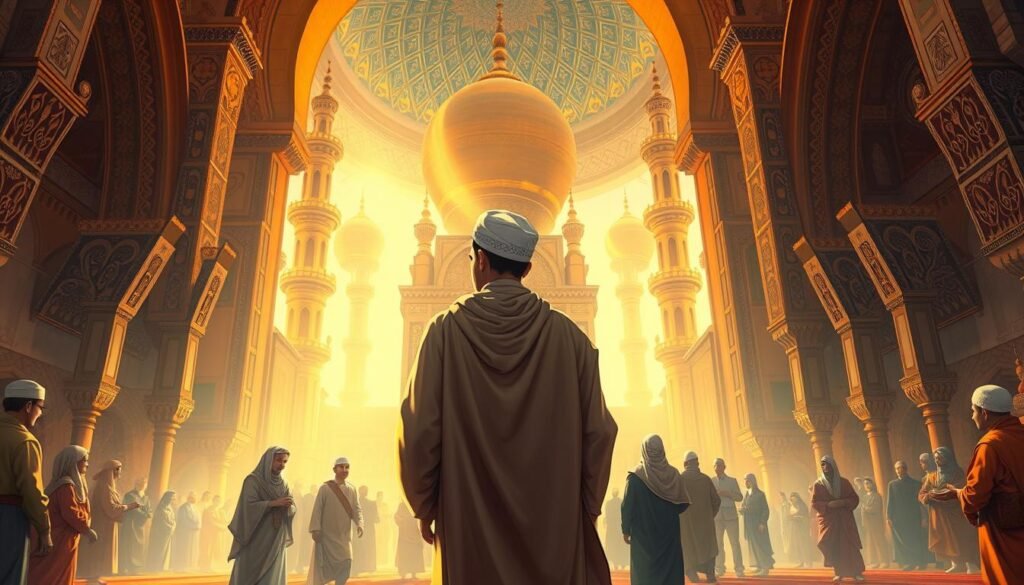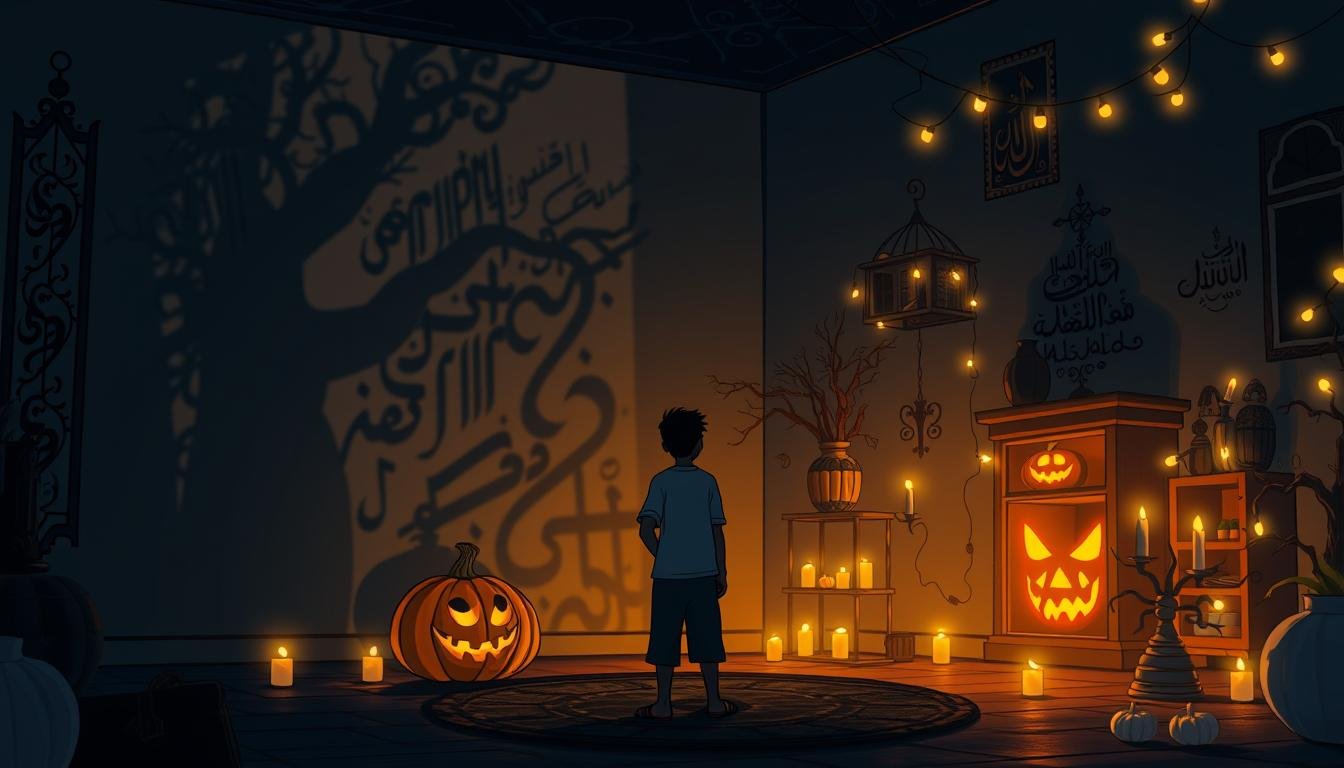Every October, jack-o’-lanterns light up streets. Children laugh and play in spooky costumes. But for many Muslims in America, this scene raises a question: can a Muslim celebrate Halloween without losing faith? This question is like autumn mist—familiar yet not fully answered. Halal or haram halloween? It’s a real debate between cultural identity and religious beliefs.
Halloween’s $9 billion industry shows its big impact. 175 million Americans spend $86.79 each. But Halloween’s history is tied to ancient Celtic Samhain, where masks were used to keep away spirits. Islamic teachings focus on Tawhid—the belief in one God. They reject rituals tied to other gods. How do we bridge this gap?
As a parent, I’ve thought about my child’s Halloween choices. Does wearing a witch costume go against the Quran’s teachings? Scholars like Ibn Taymiyah say to avoid imitating non-Muslims. Yet, communities hold storytelling nights about Islamic heroes. It’s not just about candy or costumes—it’s about keeping our identity strong.
Can we find a way to honor our faith and humanity? This debate asks us to think deeply. We’ll explore different views based on scripture, culture, and personal experiences. This will help us understand Halloween’s place in our lives.
The Origins of Halloween and Its Modern Practices
Halloween started with the ancient Celtic festival of Samhain. It was celebrated in Ireland and Britain. This festival marked the end of harvest and a time when spirits could enter the living world.
The islamic view on halloween looks at these origins. But today’s celebrations like costume parties and pumpkin carving are very different.
Pagan Roots and Historical Evolution
Samhain included bonfires to honor gods and keep away bad spirits. When Christianity came, November 1 became All Saints’ Day. This mix created Halloween, a holiday with many meanings.
Contemporary Halloween Celebrations in America
Irish immigrants brought Halloween to the U.S. in the 1800s. It became a holiday about costumes and trick-or-treating. Now, 90% of Americans join in, spending over $9 billion each year.
These customs focus on creativity and community. They are important for Muslims thinking about joining in.
The Commercialization of Halloween
“Halloween remains a night of evil’s influence, warns Dr. Abdullah Hakim Quick, noting trick-or-treating’s resemblance to begging—a practice discouraged in Islamic teachings.
Today, Halloween is all about buying things. But its old symbols like jack-o’-lanterns are remembered. This mix of old and new sparks debates about halloween in islam and its values.
Islamic Principles on Cultural Participation
Islamic teachings guide us on how to deal with non-Muslim traditions. The Quran and Prophet Muhammad’s teachings help us know what’s okay and what’s not. When it comes to muslim halloween participation, we must ask, “Does this keep preserving islamic values?”

The Quran tells us to stay away from false beliefs (Quran 25:72). It also teaches us to be dignified and avoid harmful practices. The hadith says, “Whoever imitates a people is one of them,” showing the importance of keeping our faith strong.
But not everything from other cultures is bad. What matters is our intention. If our actions help us stay true to our faith, that’s okay.
“And those who do not witness falsehood—those are the guided ones.” (Quran 25:72)
Islamic teachings focus on our intentions and the situation. For instance, giving out treats without the Halloween spirit is different from fully joining in. Scholars say we should avoid things that go against our belief in one God or encourage superstition.
This way, families can make choices that keep preserving islamic values while connecting with others.
Today, people talk about Surah Al-Furqan’s advice to ignore evil talk with grace. When dealing with Halloween, we teach kids about Eid and think carefully about cultural trends. It’s about finding a balance between muslim halloween participation and keeping our faith strong.
Can a Muslim Celebrate Halloween? Different Perspectives
The debate on cultural participation is ongoing. The question can a muslim celebrate halloween is a sensitive topic in Muslim communities. Islamic scholars say we must balance tradition with modernity.
Some argue Halloween’s pagan origins go against Islamic principles. Others see its secular aspects as acceptable today.
Conservative Islamic Viewpoints
Traditional scholars like Ibn Taymiyah and Ibn al-Qayyim oppose Halloween. They say it goes against Quranic verses that forbid imitating non-Muslim rituals. They point out Halloween’s roots in Samhain, a festival honoring the dead, as conflicting with Islamic teachings on monotheism.
Many scholars say that even secular activities can blur religious identity. They reference prohibitions on celebrating non-Islamic holidays.
Moderate Muslim Interpretations
Moderate voices see a difference between cultural fun and religious endorsement. Some scholars say activities like costume parties or festive gatherings, without pagan symbols, might fit Islamic values. Yet, 75% of scholars warn of cultural dilution risks.
The Egyptian Fatwa Board notes Halloween’s commercialization has made it a social event. This is a point 45% of Muslims mention when allowing limited participation.
Scholarly Opinions and Fatwas
Islamic scholars on Halloween have different views. While 70% caution against participation, others stress the importance of intention (niyyah). The Dar al-Ifta al-Misriyyah advises parents to guide children toward Islamic festivals like Eid.
This ensures celebrations follow Quranic guidance. This nuanced approach shows the complexity of faith in diverse societies.
Theological Concerns About Halloween Participation
Islamic teachings stress the importance of clear beliefs. No images should take the place of Allah’s oneness. Halloween decorations with ghosts, witches, and occult themes worry some scholars.
Wearing costumes of mythical creatures can blur the line between creation and the Creator. This might lead to muslim identity western holidays tensions. The question is: Does celebrating such imagery align with Quranic principles?

Islamic tradition warns against imitating practices that go against monotheism. Even secular rituals like trick-or-treating, where kids act like supernatural beings, may be seen as wrong. The Prophet Muhammad (peace be upon him) taught against looking like non-Muslims in unique religious customs, known as tashabbuh.
Yet, debates continue: Is cultural participation harmless, or does it weaken muslim identity western holidays?
Keeping one’s identity intact is key. Halloween’s origins are unclear, but its popularity in the West makes families question. Do festive practices dilute Islamic values? Finding a balance is important—enjoying cultural moments without losing faith.
One parent said, “We celebrate Eid with joy, teaching our kids about gratitude and faithfulness.”
Dealing with halloween religious concerns needs careful thought. Are symbols just for fun, or do they have deeper meanings? The goal is to find harmony between global culture and timeless faith.
Muslim Families Navigating Halloween in American Society
My childhood in Dhahran taught me about cultural duality. Like many muslim children and halloween journeys today, finding balance is key. Some families choose not to celebrate halal or haram halloween, while others find ways to honor both faith and community.
American Muslims face big challenges with Halloween’s $10.6 billion industry. Over 60% of U.S. parents let kids trick-or-treat. But Islamic teachings require careful thought.
One parent said, “We explain that Islam’s values don’t forbid smiling at neighbors while respectfully declining candy.”
Community strategies vary: some host iftar-style gatherings, while others teach Islamic values of generosity. A Chicago-based imam said, “We organize storytelling nights about Prophet Muhammad’s mercy—turning October into a month of learning.”
The Prophet’s teachings on neighborly kindness (hadith: feeding neighbors) guide many families. They keep connections without participating in Halloween.
As 61% of Muslims feel cultural pressure, creative solutions emerge. Teachers get notes about dietary restrictions, and kids exchange dates with neighbors instead of candy. These small acts help preserve identity and foster understanding.
Alternative Celebrations for Muslim Communities
Many communities are looking for islamic alternatives to halloween. At Crescent Moon Bookstore, families enjoy storytelling nights. They share Quranic tales and stories of the Prophet’s (PBUH) life.
These stories teach children about patience, mercy, and justice. They make autumn a time for moral reflection.
Islamic Festival Options
Halal-ween and Harvest Festivals are now popular. They have costumes of prophets and righteous figures. Kids dress up as Prophet Yusuf or Khadijah.
They also enjoy halal snacks. The 15th of Sha’ban is a night for prayers and remembrance. Families also celebrate Eid, showing gratitude for Allah’s blessings.
Community-Based Activities
Local mosques have iftars and quranic recitation contests. These events are fun and faith-based. Baking sessions teach kids about Islamic history through traditional sweets.
Community service projects, like food drives, teach sadaqah. These activities bring families together, focusing on shared values.
Educational Opportunities
Art workshops teach Islamic calligraphy and geometric patterns. Nature walks help kids see Allah’s creation in autumn leaves. Talks explain Islamic views on death and the unseen.
These talks help kids understand Halloween themes better. They turn confusion into learning moments.
Finding Balance Between Religious Values and Cultural Integration
Muslim families in the U.S. face a big challenge. They must balance Halloween’s cultural pull with preserving islamic values. With over 3.3 million Muslims in America, 65% foreign-born, talking across generations is key. How can we teach kids to participate without losing their faith?
Teaching Moments for Muslim Children
Every October, parents use Halloween as a teaching time. A 2007 study showed Muslim youth dealing with muslim identity western holidays issues. But, talking openly can turn fear into understanding.
Explaining why Islam doesn’t accept superstition, like Halloween’s roots, helps kids think critically. “Why don’t we carve pumpkins?” a child might ask. This question leads to discussions about Ramadan iftars or Eid decorations, linking traditions to the Quran.
Maintaining Islamic Identity in Western Contexts
Cultural integration is not about giving up who you are. The Canadian Muslim School shows this with its 300 students from 20 countries. They learn both Islamic studies and Canadian history, showing identity can be diverse.
When families choose to participate in a way that respects their values, like enjoying harvest parties without Halloween costumes, they set a good example. Scholar Tariq Ramadan says cultural exchange can be good if it brings people together.
This path requires humility and being open to change. With 21% of American Muslims being converts, their stories show faith and culture can mix well. By picking activities that show empathy, like collecting food instead of candy, we turn cultural events into chances to help others. Finding balance is a living thing that makes our community stronger.
The Broader Context of Muslim Participation in Western Holidays
Halloween started as a Celtic festival but now it’s a $10.6 billion industry. It has changed a lot over time. Today, it’s about costumes, community, and giving back, not ancient rituals.
For American Muslims, holidays like Halloween, Thanksgiving, or Valentine’s Day are tricky. They must choose between cultural fun and sticking to their faith. Scholars say it’s okay to enjoy holidays, as long as they don’t go against Islamic teachings.
Islamic teachings warn against practices that might lead to idolatry. But, many see Halloween as a fun event, not a religious one. Parents might let kids trick-or-treat, but avoid anything too spooky.
This way, families can enjoy the holiday spirit while staying true to their faith. It’s all about finding a balance.
Debates about halloween in islam show the challenges Muslims face in new places. Some say the Prophet Muhammad adapted local customs to fit Islam. Today, Muslims can see Halloween as a chance to give and be kind, without the old pagan meanings.
By focusing on the good parts of holidays, families can celebrate together. They keep their faith strong while also feeling part of the community. This way, traditions can grow and change, but always stay true to what’s important.
FAQ
Should Muslims participate in Halloween celebrations?
What are the origins of Halloween?
How has Halloween evolved in modern America?
What are Islamic principles related to cultural participation?
What are some conservative Islamic viewpoints on Halloween?
Are there moderate Muslim interpretations of Halloween participation?
What theological concerns do Muslims have regarding Halloween?
How do Muslim families navigate Halloween in American society?
What alternative celebrations do Muslim communities create during Halloween?
How can parents teach Muslim values through holidays like Halloween?
How does Halloween participation relate to other Western holidays for Muslims?

Embracing Faith, One Insight at a Time!
The teachings of the Quran have always guided my path. With a deep passion for Islamic knowledge, I strive to blend the wisdom of tradition with the relevance of today, making the timeless messages of Islam accessible and meaningful for everyone.
Muslim Culture Hub is my platform to share historical insights and thought-provoking articles, exploring both well-known and lesser-discussed aspects of Islamic culture and beliefs. My mission is to create an inclusive online space where everyone can learn, strengthen their faith, and connect with the profound message of Islam.
Join the journey!
May peace be upon you.








